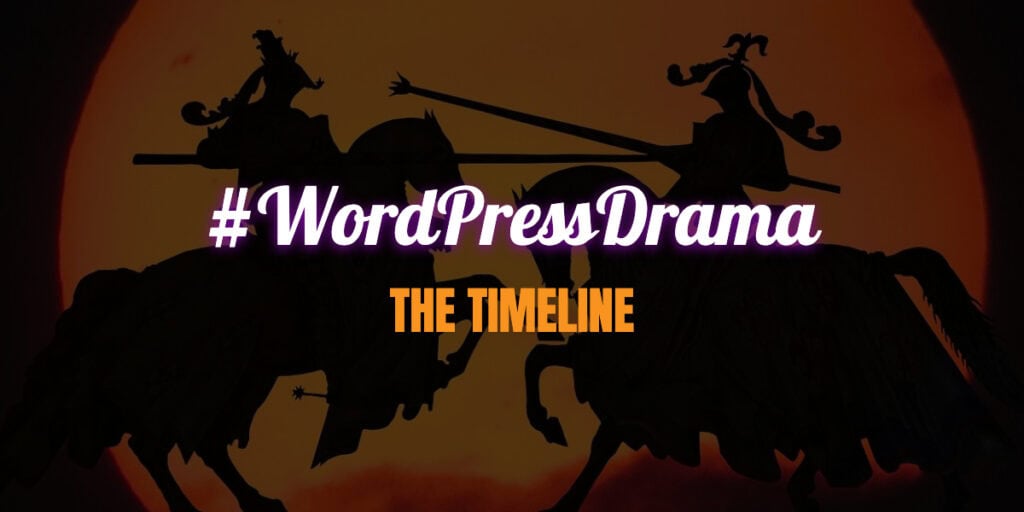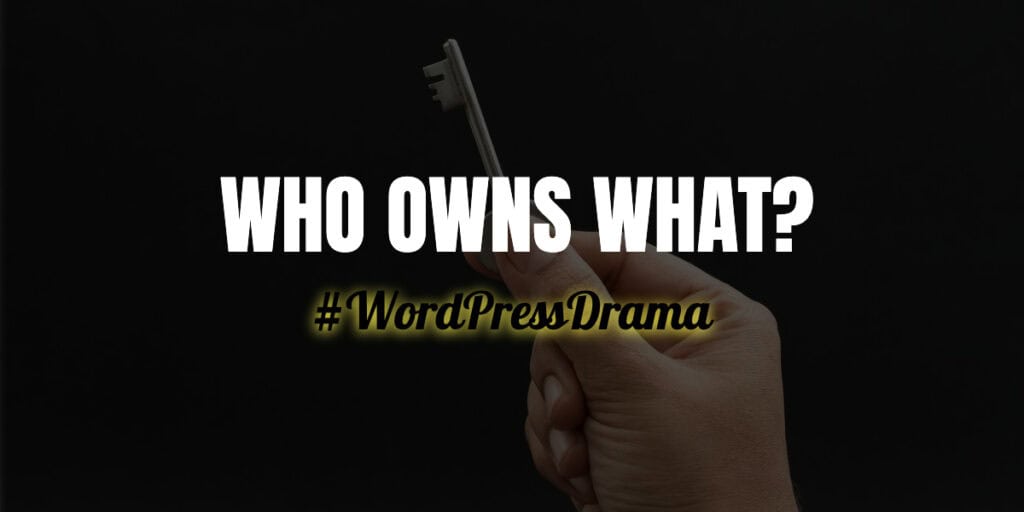The ongoing drama between WordPress and WP Engine is a complex saga involving legal battles, community backlash, and debates over open-source ethics. At the heart of the conflict is the tension between Matt Mullenweg, co-founder of WordPress and CEO of Automattic, and WP Engine, a leading managed WordPress hosting provider.
Practically speaking, Matt Mullenweg currently controls everything related to WordPress, including the core system, WordPress.org, WordPress.com, WordPress TV, plugin and theme updates, official Slack communications, various popular news sources, and the organization of WP Meetups and WordCamps.
However, technically, WordPress is an open-source content management system (CMS) licensed under the GNU General Public License (GPL), meaning it is free for anyone to use, modify, and distribute. Its success is due to the continuous hard work of a vast community of volunteers and contributors worldwide, working under the WordPress Foundation to ensure its ongoing evolution and improvement. The WordPress Foundation is a non-profit organization that owns the WordPress trademarks. But if it is open-source, why did Matt call out WP Engine for using it and demand more contribution hours or 8% of revenue?
Confusion often arises from the dual roles played by Matt Mullenweg. While he is a key figure in the WordPress Foundation, he also founded Automattic, a for-profit company that owns WordPress.com and other related services like WooCommerce and Jetpack. This distinction is critical: WordPress.org (the open-source project) is separate from WordPress.com (a commercial service), though both share a common origin. Moreover, the WordPress.org domain is apparently personally owned by Matt, not by the WordPress Foundation, which adds to the confusion.
To clarify matters, here is a brief overview of the different stakeholders in this drama to reduce confusion later on, as it is somewhat tricky. I hope to expand on this further at a later point.
Silver Lake
Silver Lake is a prominent global private equity firm that focuses on technology and technology-enabled investments. It was founded in 1999 during the late 1990s technology boom and is headquartered in Menlo Park, California, with additional offices in New York, London, and Hong Kong. The firm was established by notable figures such as Jim Davidson, David Roux, Roger McNamee, and Glenn Hutchins, each bringing a wealth of experience from various sectors within the tech industry and investment banking. The firm focuses on companies in the technology, media, and telecommunications sectors, as well as those benefiting from technology-enabled transformations.
Board Structure
Silver Lake is currently led by Co-CEOs Egon Durban and Greg Mondre, with Ken Hao serving as the chairman. The firm has a robust leadership team that includes managing partners like Joe Osnoss and Christian Lucas, who was promoted to managing partner in December 2023. The firm’s leadership team also includes Mike Bingle as vice chairman and managing partner emeritus, and Joe Osnoss as a managing partner.
The board structure of Silver Lake involves a mix of managing partners and directors who bring diverse expertise to the firm. This includes roles such as Managing Director and Chief Technology Officer, Chief Data Scientist, and various other senior positions that oversee different aspects of the firm’s operations
Financial Overview
- Valuation: While specific valuation details are not publicly disclosed, Silver Lake manages over $104 billion in combined assets, making it one of the largest private equity firms globally.
- Assets Under Management: Silver Lake manages over $104 billion in combined assets[
- Revenue: The firm’s annual revenue was reported to be $336.1 million in 2024
- Valuation and Market Impact: Silver Lake’s portfolio companies collectively represent more than $1 trillion in cumulative enterprise value, indicating a significant market presence across various sectors.
- Profitability: Over the past 15 years, Silver Lake’s flagship funds have generated a 21% rate of return, net of fees, showcasing its strong profitability and investment success.
Early Investments and Growth
Since its inception, the firm has made numerous significant investments across various sectors. Here’s an overview of its investment history:
- 1999: Silver Lake was founded with a focus on mature technology companies. The firm raised its first fund, Silver Lake Partners, with $2.3 billion in commitments.
- 2004: Raised Silver Lake Partners II with $3.6 billion in commitments.
- 2007: Raised Silver Lake Partners III with $9.6 billion in commitments and launched Silver Lake Sumeru, a middle-market investment business.
Notable Investments
- 2009: Acquired 65% of Skype for $1.9 billion, later selling it to Microsoft for $8.5 billion in 2011.
- 2011: Invested in Alibaba Group, which became highly profitable following Alibaba’s IPO in 2014.
- 2013: Played a key role in the $24.4 billion buyout of Dell Technologies.
- 2019: Made a $500 million equity investment in City Football Group and acquired First Advantage for $1.25 billion.
- 2020: In 2020, Silver Lake invested $1 billion in Airbnb to support its operations during the COVID-19 pandemic
- 2020: Led Waymo’s first external investment round with a $2.25 billion funding in 2020.
- 2022: Invested €344 million initially and later offered to buy out the firm Software AG for €2.2 billion in 2022.
- 2023: Acquired Qualtrics for approximately $12.5 billion.
Recent Investments
- 2024: Announced a $6.4 billion equity investment in Vantage Data Centers alongside DigitalBridge.
Investment in WordPress
In the WordPress ecosystem, Silver Lake made a substantial investment in WP Engine, a leading WordPress Digital Experience Platform. In 2018, Silver Lake invested $250 million in WP Engine to accelerate innovation and fuel international growth. This investment underscores Silver Lake’s strategy of supporting digital platform businesses that align with its core values.
Silver Lake’s strategy involves leveraging its deep understanding of the technology landscape to provide strategic guidance and operational support to its portfolio companies. This approach has helped these companies grow and expand significantly.
Charity and Non-Profit Work
While Silver Lake is primarily known for its strategic investments, there is no specific information indicating direct involvement in charitable activities or non-profit work related to open-source projects. The firm’s primary focus remains on creating long-term value through strategic partnerships and investments.
Overall, Silver Lake continues to be a major player in the private equity landscape, known for its expertise in technology investing and its ability to drive innovation and growth within its portfolio companies.
Silver Lake continues to be a major player in private equity, focusing on technology and technology-enabled investments to drive growth and innovation across industries.
Reference links & for further reading:
- Silver Lake Partners – Wikipedia
- Silver Lake Official Website
- People at Silver Lake
- Vantage Data Centers Announces $6.4 Billion Equity Investment Led by DigitalBridge and Silver Lake
- Silver Lake Portfolio
- Leadership at Silver Lake
- Silver Lake Closes $20.5 Billion Fundraise for SLP VII
- Silver Lake News
- Silver Lake on Silicon Valley Journals
- Silver Lake on Unicorn Nest
- DigitalBridge and Silver Lake Invest $6.4 Billion into Vantage
- Zuora Announces $400 Million Strategic Investment from Silver Lake
- Why Silver Lake is Making Bold Bets in India – Times of India
- ProPublica Nonprofit Organizations – Silver Lake Partners
- WP Engine Raises $250M from Silver Lake – TechCrunch
- World Economic Forum – Silver Lake
- Silver Lake Secures $20.5 Billion for Latest Technology Investment Fund
- Milestone Announcement – WP Engine
- OpenSecrets Summary for Silver Lake Partners
- Zuora’s $10 Billion Leap: Silver Lake Acquisition Sparks Tech Industry Buzz
- RocketReach Profile for Silver Lake
- Silver Lake Partners VII Closes at $20.5 Billion – Stinson LLP
- Silver Lake Attracts $20.5 Billion for AI-Fueled Tech Deals – Alternatives Watch
- Silver Lake Executives – Zippia
WP Engine
WP Engine is a leading WordPress Digital Experience Platform that provides hosting services for websites built on the WordPress content management system. It was founded in 2010 in Austin, Texas, by Jason Cohen and Ben Metcalfe. Jason Cohen was the main founder and previously established SmartBear Software. Initially, WP Engine had 30 customers and one product. In 2013, Heather Brunner was hired as COO and later became CEO.
The company remains privately held, with Heather Brunner as the current CEO. WP Engine has expanded internationally, establishing offices in Limerick, Ireland, while continuing its growth in Austin. It has launched new products like Atlas and serves over 1.5 million users across more than 150 countries, solidifying its position in the WordPress hosting industry.
Investment History
- 2011: WP Engine raised $1.2 million in a Series A round led by Silverton Partners, with participation from angel investors such as Eric Ries and Automattic, the company behind WordPress.com[3].
- 2012: The company secured additional funding in a Series B round.
- 2014: WP Engine raised $15 million in a venture round from North Bridge Venture Partners[5].
- 2015: Another funding round brought in $23 million, again led by North Bridge Venture Partners[5].
- 2018: Silver Lake made a significant investment of $250 million, marking one of the largest rounds for WP Engine. This investment helped the company expand its Digital Experience Platform and fuel international growth[1][5].
Charity and Non-Profit Work
WP Engine actively participates in the WordPress community and contributes to open-source projects. The company is involved in initiatives like “Five for the Future,” which encourages organizations to contribute 5% of their resources to WordPress development. However, there has been some criticism regarding the extent of their contributions compared to other companies like Automattic[6].
Overall, WP Engine has successfully leveraged its investments to grow and innovate within the WordPress ecosystem while maintaining a commitment to supporting open-source projects.
Board Structure
WP Engine is currently led by Heather Brunner, who serves as the Chairwoman and CEO. Under her leadership, the company has expanded significantly, becoming a global brand with over 1,200 team members worldwide. The leadership team includes key figures such as Jason Teichman (COO), Ramadass Prabhakar (SVP & CTO), and Annette Alexander (Chief People Officer), among others, who are responsible for driving the company’s strategic direction and growth.
The board of directors at WP Engine includes representatives from major investors and industry experts. Notable board members include Greg Mondre and Lee Wittlinger from Silver Lake, reflecting the firm’s significant investment in WP Engine.
Financial Overview
- Valuation: As of 2024, WP Engine reached a valuation of $1 billion.
- Revenue: The company reported a revenue of $400 million in 2024.
- Market Share: WP Engine is a leader in the managed WordPress hosting market, serving over 120,000 customers globally. It powers more WordPress websites among the top one million most trafficked sites than any other managed WordPress host.
- Profitability: While specific profitability details aren’t disclosed, WP Engine’s substantial growth in revenue and customer base indicates a strong financial position.
WP Engine continues to be a prominent player in the WordPress ecosystem, focusing on enhancing digital experiences through its platform while navigating challenges related to its use of WordPress trademarks and contributions to open-source projects.
Reference links & for further reading:
- WP Engine Announces New Board and Executive Appointments
- WP Engine Leadership Team on The Org
- WP Engine Announces $132M Annual Recurring Revenue
- WP Engine on GetLatka
- WP Engine Cease and Desist Document
- Heather Brunner – WP Engine Leadership Team
- Milestone Announcement – WP Engine
- Ramadass Prabhakar – WP Engine Leadership Team
- Jason Teichman – WP Engine Leadership Team
- Automattic and WP Engine WordPress License – The Register
- WP Engine – Wikipedia
- The WordPress Economy – WP Engine
- About Us – WP Engine GB
- WP Engine Closes $1.2M in Series A Financing
- WP Engine on Growjo
- WP Engine Financials – CB Insights
- I Bootstrapped 3 Companies to Millions in ARR – Reddit
- WP Engine on EquityZen
Automattic
Automattic Inc. is a global distributed company founded in August 2005 by Matt Mullenweg, who is also the creator of WordPress. Automattic is best known for running WordPress.com, a freemium blogging service, and for its significant contributions to the open-source WordPress software.
Investment History
Automattic has raised a total of $861.69 million over ten funding rounds. Some key investments include:
- 2006: Automattic raised approximately $1.1 million in its initial funding round from investors like Polaris Ventures, True Ventures, and Radar Partners.
- 2008: Raised $29.5 million in a Series B round led by Polaris Venture Partners.
- 2013: Secured a Series C funding round of $75 million.
- 2014: Raised $160 million in a funding round led by Insight Venture Partners, with participation from True Ventures, Chris Sacca, Endurance, Tiger Global Management, and Iconiq.
- 2019: Raised $300 million in a Series D round from Salesforce Ventures, which valued the company at $3 billion.
- 2021: Closed a Series E funding round of $288 million with investors such as BlackRock, Wellington Management, and ICONIQ Capital, among others.
- 2024: Conducted a $250 million share buyback at a valuation of $7.5 billion.
Investments Made by Automattic
Automattic has made 18 investments in various companies and projects. Some notable investments include acquisitions of companies like Parse.ly, Day One, Pocket Casts, and investments in Element and Titan.
Automattic, the company behind WordPress.com and several other digital products, is currently led by its founder, Matt Mullenweg, who serves as the CEO. The company’s board of directors includes notable figures such as Phil Black, co-founder of True Ventures; Toni Schneider, former CEO of Automattic; Ann E. Dunwoody, a retired U.S. Army general; and Susan Decker, former President of Yahoo! Inc.
Board Structure
- Matt Mullenweg: Founder and CEO
- Phil Black: Co-founder of True Ventures
- Toni Schneider: Former CEO of Automattic
- Ann E. Dunwoody: Retired U.S. Army General
- Susan Decker: Former President of Yahoo! Inc.
Financial Overview
- Valuation: Automattic is valued at approximately $7.5 billion as of 2024.
- Revenue: The company reported a revenue of around $710 million in 2024.
- Market Share and Profitability: Automattic operates a wide range of products and services, including WordPress.com, WooCommerce, Jetpack, and Tumblr. It is a major player in the content management system market through its contributions to WordPress.org, which powers a significant portion of the web. While specific profitability details are not publicly disclosed, the company’s valuation and revenue figures suggest strong financial health.
Charity and Non-Profit Work
Automattic is deeply involved in the open-source community, primarily through its contributions to WordPress.org. The company supports initiatives like “Five for the Future,” encouraging organizations to contribute resources to WordPress development. Despite some criticism regarding the proportion of its revenue dedicated to open-source contributions, Automattic remains a significant contributor to projects like the PHP Foundation and ESLint. Despite these contributions, there has been some criticism regarding the proportion of its revenue allocated to open-source initiatives compared to its overall earnings.
Overall, Automattic continues to be a key player in the digital publishing and web development space, leveraging its investments and open-source contributions to drive innovation and growth.
Reference links & for further reading:
- Automattic Board
- WordPress.com – Wikipedia
- Who Owns WordPress? – WP Indigo
- Automattic’s OSS Contributions for 2024 – Reddit
- Automattic Press Releases
- Automattic Raises $300M in Series D Investment Round, Valuation Jumps to $3 Billion – WP Tavern
- Automattic Raised $160 Million, $1.16 Billion Company Valuation – Post Status
- Automattic IPO Information – Forge Global
- Automattic Financials – CB Insights
- Automattic on EquityZen
- Funding, Buyback, and Hiring – Matt Mullenweg’s Blog
WordPress Foundation
The WordPress Foundation is a non-profit organization founded in January 2010 by Matt Mullenweg, co-founder of WordPress. Its primary mission is to support the open-source WordPress project and ensure free access to WordPress and related software projects in perpetuity. The foundation aims to democratize publishing through open-source, General Public License (GPL) software. As part of this, the organization owns and manages WordPress, WordCamp and related trademarks.
Investment History
The WordPress Foundation, as a non-profit organization, does not seek traditional investments for profit. Instead, it relies on contributions and grants to support its activities. For instance, in 2013 and 2014, the foundation reported receiving contributions and grants amounting to $848,925 and $1,181,193, respectively. These funds are used to support its educational initiatives and manage events like WordCamps.
Some notable donors include Bluehost, which contributes $5,000 annually as a “Guardian” level sponsor. Other supporters include All-in-One WP Migration, Awesome Motive (Syed Balkhi), Elementor Hosting, Jetpack, and others who contribute varying amounts, typically starting from $1,000.
Leadership and Board Structure
Matt Mullenweg is a key figure in the WordPress Foundation, serving as the director. The board of directors includes individuals like Mark Ghosh and Chele Chiavacci Farley. However, detailed information about the board structure is somewhat limited and not prominently featured on the foundation’s website
Charity and Non-Profit Work
The WordPress Foundation is actively engaged in charitable activities within the open-source community. It provides logistical and financial support to volunteer organizers of WordCamps, educational events focused on WordPress, and manages funds to protect organizers from financial risks. The foundation also supports initiatives such as WordPress TV, which ensures that WordCamp sessions are accessible online, offering free educational content globally. Additionally, it backs “do_action” charity hackathons and has made contributions to organizations like Black Girls Code and the Internet Archive.
Through these efforts, the WordPress Foundation plays a vital role in fostering the open-source community, promoting education, and ensuring the sustainability of WordPress projects.
Reference links & for further reading:
- Who Owns the WordPress Website and WordPress.org? – Plugin Vulnerabilities
- Who is on the WordPress Foundation Board? – Plugin Vulnerabilities
- WordPress Foundation Financials and a Separate WordCamp Organization – Post Status
- WordPress Trademark Policy
- WordPress Foundation Official Website
- What is the WordPress Foundation and Why Does It Exist?
- WordPress Foundation – Simple Wikipedia
- WordPress Foundation Donors
- 2019 Financials – WordPress Foundation
- WordPress Foundation – Open Source Initiative Blog
Who Own What – Trademarks & Rights
WordPress Foundation
The WordPress Foundation owns several trademarks that are crucial to its mission of supporting the open-source WordPress project and ensuring the integrity and reputation of the WordPress brand. Here are the trademarks owned exclusively by the WordPress Foundation:
- WordPress: The foundation owns the trademark for “WordPress,” which was transferred from Automattic in 2010.
- WordCamp: his trademark is associated with community-organized events that focus on WordPress education and networking. It is technically owned by WordPress Community Support, PBC, a subsidiary of the foundation.
- BuddyPress: A plugin for social networking within WordPress sites.
- bbPress: Forum software built to integrate with WordPress.
- WP-CLI: Command-line interface for managing WordPress installations.
- Openverse: A platform for openly licensed media.
Additionally, the foundation has pending trademark applications for:
- Managed WordPress
- Hosted WordPress
These applications were filed in July 2024 and are intended to cover various aspects of web hosting and software services related to WordPress[1]
The WordPress Foundation’s trademarks help maintain the quality and trust associated with the WordPress brand, especially in an open-source environment where intellectual property is freely accessible.
Read more on this here:
- WordPress Files to Trademark Managed WordPress, Hosted WordPress
- WordPress Trademarks: A Legal Perspective
- WordPress Trademark Policy
- The WordPress Trademarks and the Classes of Activity They Cover
Automattic
Automattic, the company founded by Matt Mullenweg, owns several trademarks, particularly related to its products and services.
- Woo®
- WooCommerce®
- WooExpert®
- Woo Partner™
- WooPay™
- WooPayments™
- WooThemes®
- Hosted Woo™
- Managed Woo™
- Jetpack: A suite of tools for WordPress sites.
WordPress Commercial License
While Automattic does not own the WordPress trademark outright, it holds an exclusive commercial license for its use. This license allows Automattic to use the WordPress trademark for commercial purposes, such as selling software, hosting, and agency services. The WordPress Foundation owns the non-commercial rights to the WordPress trademark but licenses the commercial rights back to Automattic.
Overall, Automattic’s trademark portfolio reflects its focus on e-commerce and digital publishing platforms, with WooCommerce being a significant component of its business strategy.
Matt Mullenweg
Matt Mullenweg, as an individual, does not personally own any distinct trademarks separate from those held by the WordPress Foundation or Automattic.
Matt Mullenweg, as an individual, does not own any trademarks exclusively. The trademarks related to WordPress and its associated projects are primarily owned by the WordPress Foundation and Automattic, the company he founded. However, apparently he personally owns the WordPress.org domain rights.
External Resources to read further on this:
- WordPress Files to Trademark Managed WordPress, Hosted WordPress
- The WordPress Trademarks and the Classes of Activity They Cover
- Open Source Trademarks: WP Engine
- Matt Mullenweg Claims the WordPress Trademark Was Donated to the WordPress Foundation; Automattic’s Lawyer Disagrees
- Automattic Financials
- Who Owns the WordPress Website and WordPress.org?
- Internal Blog Post Reveals Automattic’s Plan to Enforce the WordPress Trademark Using Nice and Not Nice Lawyers
- WordPress Trademarks: A Legal Perspective
- WooCommerce Trademark Guidelines
- Here Is the Extensive License That Automattic Has for the WordPress Trademark
- Was the WordPress Foundation Just Matt Mullenweg When It Issued Him a License for the WordPress Trademark?
- WordPress Trademark
WP Engine
WP Engine owns several trademarks that are central to its brand and operations. Here is a list of trademarks owned exclusively by WP Engine:
- WPENGINE (logo mark)
- WP ENGINE (word mark)
- PRESS AHEAD
- EVERCACHE
- GENESIS
- TORQUE
- ATLAS
- VELOCITIZE
- FROST
- FAUST.JS
- WP Migrate DB
- WP Offload
- FLYWHEEL
- STUDIOPRESS
Additionally, WP Engine has pending trademark applications for:
- ACF (Advanced Custom Fields)
- ADVANCED CUSTOM FIELDS
These trademarks cover various aspects of WP Engine’s services and products, including its hosting solutions, performance optimization tools, and content management systems.
Reference links & for further reading:





